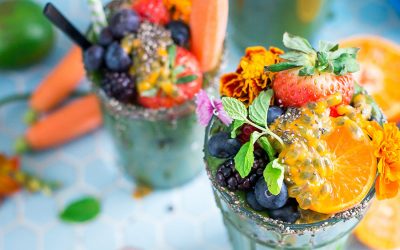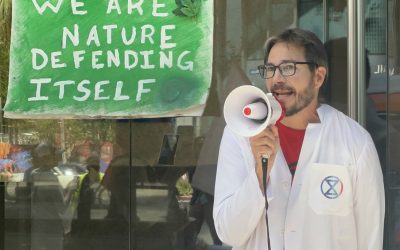Blog
Octopus farming must be stopped
June 6, 2023
Octopuses are extremely intelligent, much more complicated than what was previously believed, and should be protected at all costs. But a large Spanish fishing company, Nueva Pescanova, is attempting to open the world’s first octopus farm in Las Palmas de Gran Canaria in the Canary Islands.
Eating octopus has traditionally happened in Southeast Asia and the Mediterranean and is considered a delicacy. However, the demand for eating octopuses has increased around the world, and companies hoping to profit from this are making plans to farm them. The number of wild-caught octopuses is decreasing due to fishing, but the solution is not to create octopus farms; it’s to shift our focus and promote healthy plant-based diets.
Octopus farming is an ethical and environmental disaster, totally unsustainable, and extremely cruel to octopuses. It’s time to end all forms of factory farming, not expand the industry by farming more species.

Octopus Are Extremely Intelligent And Feel Pain When Killed
Do you know who the world’s smartest invertebrate is? If you guessed octopus, you are correct. These incredible creatures are exceptionally intelligent and can camouflage themselves very quickly by changing their color and texture to blend in with their surroundings. These chameleons of the sea have also figured out how to collect coconut shells for shelters, carry them around for protection, use them to hide from predators, and strategically arrange stones around the entrance to their den.
Scientists have discovered that octopuses are intelligent enough to do things… just for fun! (Source: BBC / YouTube)
In addition to their large brain, each of their eight arms have their own form of intelligence and can function independently of each other. Scientists discovered octopuses can react quickly to situations and process sensory information in exceptional ways. By having two-thirds of their neurons in their arms, they can also multitask very well. It’s been suggested octopuses have about 500 million neurons, of which 350 million are along their arms in clusters.
Their intelligence is perhaps what allows them to feel not only physical pain when killed but emotional pain such as feelings of distress and suffering, as outlined in this peer-reviewed study. Not only do octopuses feel pain when killed, they feel themselves being chopped up and eaten alive, a barbaric practice in some parts of the world that must end.
Octopus Farming Is Unsustainable For The Planet
Eating farmed octopuses poses serious risks to ecosystems and will add to the fishing crisis the world faces and continue to drain our oceans of fish. The company Nueva Pescanova plans to raise the octopuses in tanks on land for convenience, away from everything that is natural to these incredible creatures. Like all sentient beings capable of experiencing happiness and pain, octopuses want to live their lives in freedom.
The company has not explained how they will treat these large quantities of tank water once it’s released to nearby waterways after the octopuses are killed or addressed the use of energy and emissions caused by the operation.

Plant Based Treaty endorser Becca Franks, PhD, Research Scientist from the Department of Environmental Studies at New York University and one of the authors of The Case Against Octopus Farming, says, “Octopus farming is a reckless and backward idea that should never become a reality.”
Aquatic farms, including those with octopus, are destructive to our planet and calling this operation “sustainable” is greenwashing. About half of all fish eaten around the world are raised on land or ocean-based aquafarms. A two-acre fish farm can produce as much waste as a city of 10,000 people.
“Salmon farms in British Columbia were found to be producing as much waste as a city of half a million people.” – PETA
Octopus Farming Must Be Stopped
As the aquaculture industry continues to grow and attempts to add octopus to the list of species being exploited and killed, natural fisheries are becoming used up and more pressure is being applied to our already suffering oceans. Demand 1 of the Plant Based Treaty is to “relinquish”, including no building of new slaughterhouses, animal farms, no conversion of any land for animal feed production and no conversion of plant-based agriculture to animal agriculture.
Animal Save Movement continues to speak out against octopus farming and recently hosted a global day of action. Partnering with organizations such as Ocean Born Foundation, activists from around the world put pressure on the Gran Canaria government to stop Nueva Pescanova and raise awareness about the ethical implications and environmental consequences of the proposed octopus farm.
“…chapters protested again near Spanish embassies and restaurants serving octopus meat, against the new farm being built in Las Palmas Island. Instead of looking for sustainable and morally sound ways to attract tourism, the Gran Canaria government is supporting this awful project.” – Yael Gabay, Global Campaign coordinator for Plant Based Treaty

The Plant Based Treaty continues to pressure officials in the Canary Islands to withdraw the permit to build the farm and over 10,000 supporters have sent emails via this email action page. You can send the Spanish embassy a letter asking for the government not to allow the farm to be built. There is also a petition to boycott The Canary Islands until the octopus farm proposal is dropped and octopuses are recognised as sentient beings in Gran Canaria.
Be the voice for the octopus; these eight-armed geniuses with three hearts desperately need our help.
Take Action for Octopuses
1. Boycott the Canary Islands: Join over 100,000 others and sign the petition against the Nova Pescanova octopus farm and pledge to add them to your No Fly list!
2. Leave octopuses and other animals off your plate! Instead, check out our vegan guide if you need help getting started.
3. Send an email to Canary Islands asking them to refuse the building permit for Pescanova’s octopus farm

Miriam Porter is an award-winning writer who writes about veganism, social justice issues, and eco-travel. Miriam currently lives in Toronto with her son Noah and many rescued furry friends. She is a passionate animal rights activist and speaks up for those whose voices cannot be heard.



